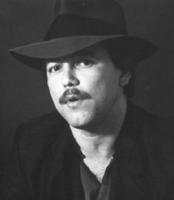 Rubén Blades Bellido de Luna (born July 16, 1948) is a Panamanian salsa singer, songwriter, lawyer, actor and politician. As songwriter, Blades brought the lyrical sophistication of South American nueva canción and Cuban nueva trova to salsa, creating thinking persons' dance music.
Rubén Blades Bellido de Luna (born July 16, 1948) is a Panamanian salsa singer, songwriter, lawyer, actor and politician. As songwriter, Blades brought the lyrical sophistication of South American nueva canción and Cuban nueva trova to salsa, creating thinking persons' dance music.
He remains wildly popular in that country and much admired throughout Latin America, and he managed to attract 20% of the vote in his failed attempt to win the Panamanian presidency in 1994. In September 2004, he was appointed minister of tourism by Panamanian president Martín Torrijos.
Blades is completely bilingual, working both in English and Spanish. His surname is either pronounced in its original English form or using Spanish phonemes; his family uses the English one.
Blades has composed dozens of musical hits, the most famous of which is "Pedro Navaja", a song about a panderer whose day to die has come.
Blades's father is a percussionist-turned-detective and his mother was a singer and radio performer. His grandfather, Reuben Blades, was an English-speaking native of St. Lucia who came to work on the canal, as he tells in the song West Indian Man on the album Amor y Control ("That's where the Blades comes from.") (1992)
After obtaining degrees in political science and law at Panama's Universidad Nacional, Blades worked at the Bank of Panama as a lawyer. In 1974, Blades moved to the United States, staying temporarily with his exiled parents in Miami before moving to New York City. Blades began his musical career in New York writing songs while working in the mailroom at Fania Records, and soon was working with salseros Ray Barretto and Larry Harlow. Shortly thereafter Blades started collaborating with trombonist and band leader Willie Colón, and they recorded several albums together. Their album Siembra (1978) became the best-selling salsa record in history.
After 1980, Blades tried to terminate his contract with Fania, but he was contractually obliged to record several more albums. These are generally considered toss-offs and Blades himself told his fans to avoid them. When he was free of his contractual obligations, Blades signed with another label, Elektra, and assembled a top-notch band (known variously as Seis Del Solar or Son Del Solar) and recorded a number of albums with them.
In the early 1980s, Blades began his career in films as a composer of soundtracks.
In 1982, Blades got his first acting role in The Last Fight writing the title song as well as portraying a singer-turned-boxer vying for a championship against a fighter who was played by real life world champion boxer Salvador Sánchez.
In 1985, Blades gained widespread recognition as co-writer and star of the independent film Crossover Dreams as a New York salsa singer willing to do anything to break into the mainstream. This same year he earned a master's degree in international law from Harvard University. He was also the subject of Robert Mugge's documentary The Return of Ruben Blades, which debuted at that year's Denver Film Festival. During the 1990s, he acted in films, mounted his unsuccessful presidential bid, founding the party Movimiento Papa Egoró, and continued to make salsa records.
His many film appearances include The Milagro Beanfield War (1988), The Two Jakes (1990), Mo' Better Blues (1990), and Devil's Own (1997). In 1999, he played Mexican artist Diego Rivera in Tim Robbins' Cradle Will Rock.
In 1997, Blades headed the cast of singer/songwriter Paul Simon's first Broadway musical, The Capeman, based on a true story about a violent youth who becomes a poet in prison. In the 2003 film Once Upon a Time in Mexico, starring Johnny Depp, Antonio Banderas, and Willem Dafoe, he played the role of a retired FBI agent.
Blades' 1999 album Tiempos which he made along with musicians from the costarican groups Editus and Sexteto de Jazz Latino, represented a break from his salsa past and a rejection of commercial trends in Latin music.
Some might say that "his biggest mistake was releasing an English-language album in 1988 in the wake of his 1987 Grammy for Escenas" [sic] but in fact, he tends to avoid commercial choices. After winning his first Grammy for Escenas in 1986 he recorded the album Agua de Luna based on the short stories of Gabriel García Márquez in 1987. The next year he released the English language collaboration with rock artists Sting, Elvis Costello, and Lou Reed the same year as Antecedente, another Grammy winner. In 2003 he followed the World Music Grammy winner Mundo with a web site free download project. As he said in 2005 when receiving the ASCAP Founders Award about his non-commercial choices, "That's the way I think."
In 2004 he put his artistic careers on hold when he began serving as Minister of Tourism of Panama.
http://en.wikipedia.org/wiki/Rub%C3%A9...